优品课件之高一英语下册Unit14 Festivals 重点句型解析
- 格式:docx
- 大小:24.21 KB
- 文档页数:7
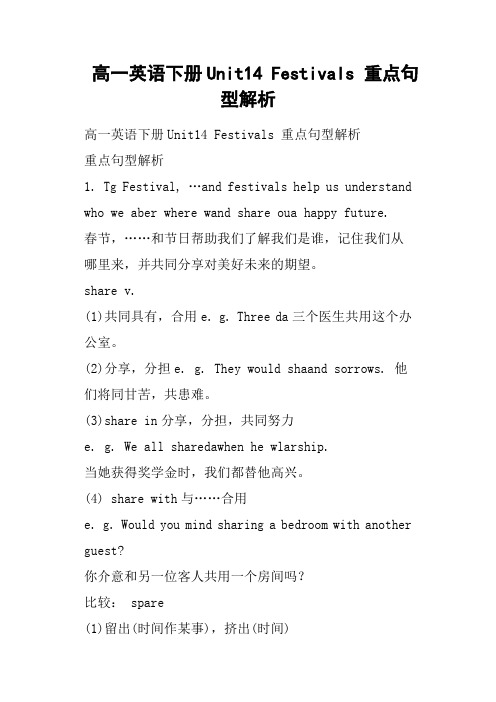
高一英语下册Unit14 Festivals 重点句型解析高一英语下册Unit14 Festivals 重点句型解析重点句型解析1. Tg Festival, …and festivals help us understand who we aber where wand share oua happy future.春节,……和节日帮助我们了解我们是谁,记住我们从哪里来,并共同分享对美好未来的期望。
share v.(1)共同具有,合用e. g. Three da三个医生共用这个办公室。
(2)分享,分担e. g. They would shaand sorrows. 他们将同甘苦,共患难。
(3)share in分享,分担,共同努力e. g. We all sharedawhen he wlarship.当她获得奖学金时,我们都替他高兴。
(4) share with与……合用e. g. Would you mind sharing a bedroom with another guest?你介意和另一位客人共用一个房间吗?比较: spare(1)留出(时间作某事),挤出(时间)e. g. Can you spalp me? 你能挤出时间帮助我吗?(2)不用,匀出(给别人用)e. g. Father couldn’t spaaad to walk.爸爸要用车,因此约翰只得步行。
(3)放过,饶(命),不杀e. g. The king spared the livwomen and children.国王放过了妇女和儿童。
save v.(1)挽救,拯救e. g. They fought bravely and saved the country. 他们勇敢战斗拯救祖国。
(2)节省,省去,省着用,保护e. g. If we buy pld now, it will savg agaweek.如果我们现在买了足够的食物,这周就省了再上街购物了。
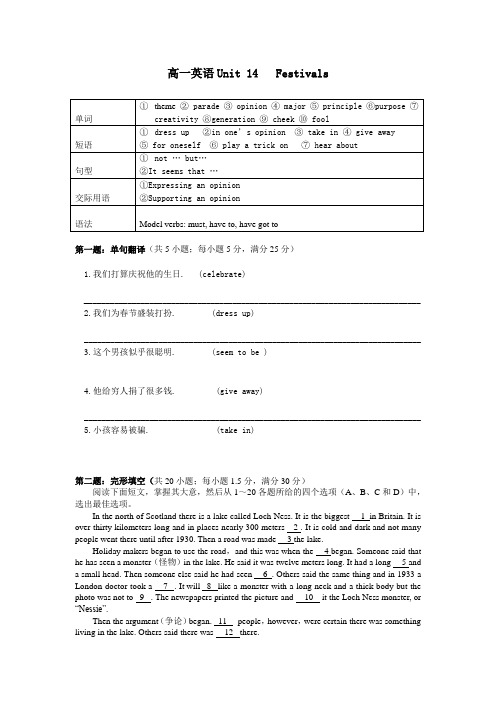
高一英语Unit 14 Festivals第一题:单句翻译(共5小题;每小题5分,满分25分)1.我们打算庆祝他的生日. (celebrate)_____________________________________________________________________________2.我们为春节盛装打扮. (dress up)_____________________________________________________________________________ 3.这个男孩似乎很聪明. (seem to be )_____________________________________________________________________________ 4.他给穷人捐了很多钱. (give away)_____________________________________________________________________________5.小孩容易被骗. (take in)_____________________________________________________________________________第二题:完形填空(共20小题;每小题1.5分,满分30分)阅读下面短文,掌握其大意,然后从1~20各题所给的四个选项(A、B、C和D)中,选出最佳选项。
In the north of Scotland there is a lake called Loch Ness. It is the biggest 1 in Britain. It is over thirty kilometers long and in places nearly 300 meters 2 . It is cold and dark and not many people went there until after 1930. Then a road was made 3 the lake.Holiday makers began to use the road,and this was when the 4 began. Someone said that he has seen a monster(怪物)in the lake. He said it was twelve meters long. It had a long 5 and a small head. Then someone else said he had seen 6 . Others said the same thing and in 1933 a London doctor took a 7 . It will 8 like a monster with a long neck and a thick body but the photo was not to 9 . The newspapers printed the picture and 10 it the Loch Ness monster, or “Nessie”.Then the argument(争论)began. 11 people,however,were certain there was something living in the lake. Others said there was 12 there.In 1961, a lot of people joined together to make a real 13 to see and photograph the monster 14 there was one! Several times people thought they saw something but after ten years there was 15 no real proof(证据).Later underwater television cameras were used, but 16 found any real proof. However, they 17 find some-thing interesting: a huge underwater cave. It was big enough to be 18 of a monster, but of course, this was not a proof.In 1975, however, some American scientists 19 a search group. They used an underwater camera(摄像机). It took pictures every seventy seconds. Some of the pictures seemed to show a red-brown creature(生物). Its 20 was about four meters long and had a very ugly head on the end of a four-meter neck. Many people then began to believe in the monster. But even today we can’t be certain.1. A. river B. ocean C. sea D. lake2. A. wide B. tall C. deep D. high3. A. in B. over C. around D. above4. A. accidents B. meetings C. sayings D. stories5. A. eye B. ear C. nose D. neck6. A. it B. one C. some D. all7. A. photo B. map C. gun D. chance8. A. sounded B. looked C. felt D. would9. A. clean B. clear C. taken D. shown10. A. called B. believed C. thought D. regarded11. A. Some B. More C. All D. No12. A. nothing B. anything C. monsters D. everything13. A. effort B. thing C. interest D. trip14. A. so B. but C. as D. if15. A. even B. still C. also D. yet16. A. someone B. no one C. anyone D. we17. A. did B. really C. were D. actually18. A. room B. house C. home D. ground19. A. found B. formed C. invited D. get20. A. head B. tail C. body D. head第三题:阅读理解(共5小题;每小题3分,满分15分)阅读下列短文,从每题所给的四个选项(A、B、C和D)中,选出最佳选项。
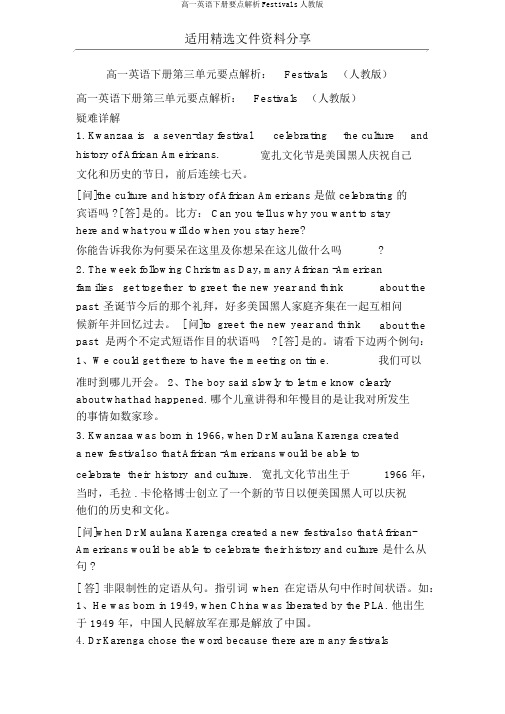
适用精选文件资料分享高一英语下册第三单元要点解析:Festivals(人教版)高一英语下册第三单元要点解析:Festivals(人教版)疑难详解1. Kwanzaa is a seven-day festival celebrating the culture and history of African Ameiricans.宽扎文化节是美国黑人庆祝自己文化和历史的节日,前后连续七天。
[ 问]the culture and history of African Americans 是做 celebrating 的宾语吗 ?[ 答] 是的。
比方: Can you tell us why you want to stayhere and what you will do when you stay here?你能告诉我你为何要呆在这里及你想呆在这儿做什么吗?2. The week following Christmas Day, many African -Americanfamilies get together to greet the new year and think about the past. 圣诞节今后的那个礼拜,好多美国黑人家庭齐集在一起互相问候新年并回忆过去。
[ 问]to greet the new year and think about the past是两个不定式短语作目的状语吗?[ 答] 是的。
请看下边两个例句:1、We could get there to have the meeting on time.我们可以准时到哪儿开会。
2、The boy said slowly to let me know clearlyabout what had happened. 哪个儿童讲得和年慢目的是让我对所发生的事情如数家珍。
3.Kwanzaa was born in 1966, when Dr Maulana Karenga createda new festival so that African -Americans would be able tocelebrate their history and culture. 宽扎文化节出生于1966 年,当时,毛拉 . 卡伦格博士创立了一个新的节日以便美国黑人可以庆祝他们的历史和文化。
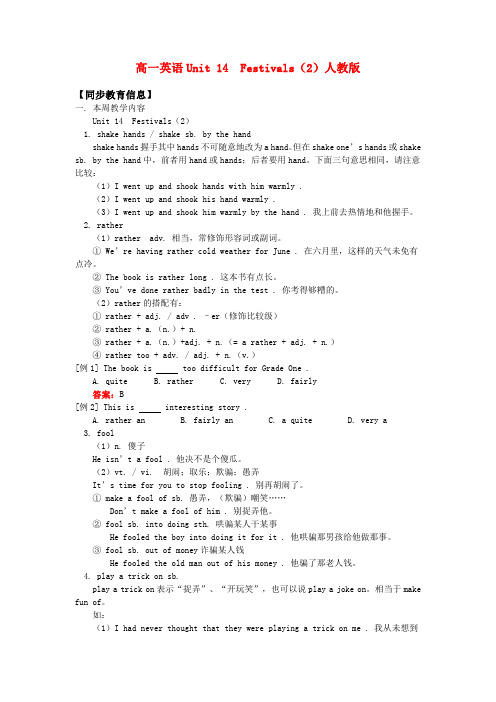
高一英语Unit 14 Festivals(2)人教版【同步教育信息】一. 本周教学内容Unit 14 Festivals(2)1. shake hands / shake sb. by the handshake hands握手其中hands不可随意地改为a hand。
但在shake one’s hands或shake sb. by the hand中,前者用hand或hands;后者要用hand。
下面三句意思相同,请注意比较:(1)I went up and shook hands with him warmly .(2)I went up and shook his hand warmly .(3)I went up and shook him warmly by the hand . 我上前去热情地和他握手。
2. rather(1)rather adv. 相当,常修饰形容词或副词。
①We’re having rather cold weather for June . 在六月里,这样的天气未免有点冷。
② The book is rather long . 这本书有点长。
③You’ve done rather badly in the test . 你考得够糟的。
(2)rather的搭配有:① rather + adj. / adv . –er(修饰比较级)② rather + a.(n.)+ n.③ rather + a.(n.)+adj. + n.(= a rather + adj. + n.)④ rather too + adv. / adj. + n.(v.)[例1] The book is too difficult for Grade One .A. quiteB. ratherC. veryD. fairly答案:B[例2] This is interesting story .A. rather anB. fairly anC. a quiteD. very a3. fool(1)n. 傻子He isn’t a fool . 他决不是个傻瓜。
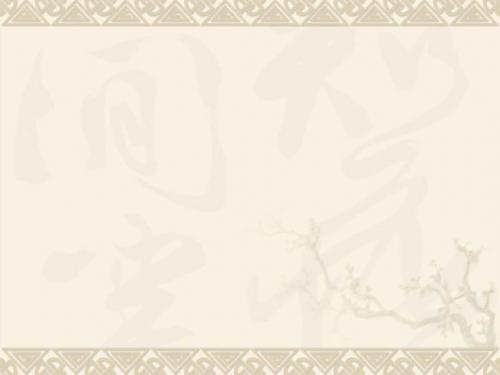
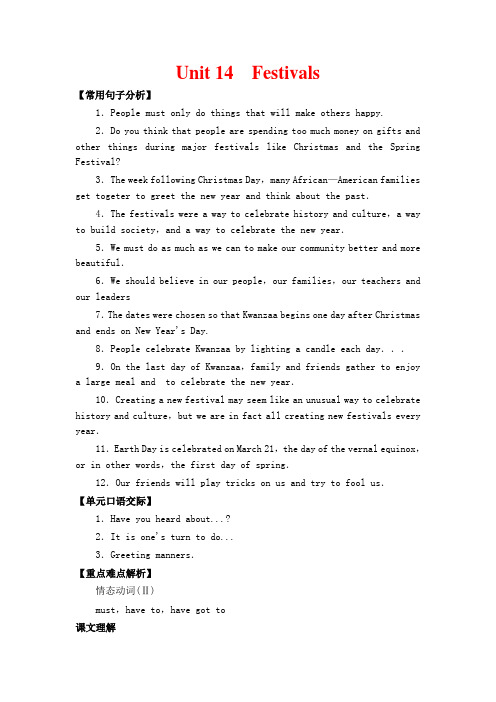
Unit 14 Festivals【常用句子分析】1.People must only do things that will make others happy.2.Do you think that people are spending too much money on gifts and other things during major festivals like Christmas and the Spring Festival?3.The week following Christmas Day,many African—American families get togeter to greet the new year and think about the past.4.The festivals were a way to celebrate history and culture,a way to build society,and a way to celebrate the new year.5.We must do as much as we can to make our community better and more beautiful.6.We should believe in our people,our families,our teachers and our leaders7.The dates were chosen so that Kwanzaa begins one day after Christmas and ends on New Year's Day.8.People celebrate Kwanzaa by lighting a candle each day...9.On the last day of Kwanzaa,family and friends gather to enjoy a large meal and to celebrate the new year.10.Creating a new festival may seem like an unusual way to celebrate history and culture,but we are in fact all creating new festivals every year.11.Earth Day is celebrated on March 21,the day of the vernal equinox,or in other words,the first day of spring.12.Our friends will play tricks on us and try to fool us.【单元口语交际】1.Have you heard about...?2.It is one's turn to do...3.Greeting manners.【重点难点解析】情态动词(Ⅱ)must,have to,have got to课文理解【常用词语探究】1. festival(1)用作名词,意思是“节日”,“喜庆日”,通常用作可数名词。
高一英语下册Unit14 Festivals 知识点整理高一英语下册Unit14 Festivals 知识点整理英语小窍门十二条经典英语谚语Pain past is pleasure (过去的痛苦就是快乐。
)2 isd in the ind is better than ne in the hand (脑中有知识,胜过手有金钱。
)3 Nthing is ipssible fr a illing heart (心之所愿,无所不成。
)4 All things are diffiult befre the are eas (凡事必先难后易。
)Great hpes ae great an (伟大的理想造就伟大的人。
)6 Gd helps thse h help theselves (天助自助者。
)7 Fur shrt rds su up hat has lifted st suessful individuals abve the rd: a little, bit re (四个简短的词汇概括了成功的秘诀:多一点点!) [比别人多一点努力、多一点自律、多一点决心、多一点反省、多一点学习、多一点实践、多一点疯狂,多一点点就能创造奇迹!]8 In ding e learn (实践长才干。
)9 East r est, he is best (东好西好,还是家里最好。
)10 T heads are better than ne (三个臭皮匠,顶个诸葛亮。
)11 Gd pan n the rad is the shrtest ut (行路有良伴就是捷径。
)12 nstant drpping ears the stne (滴水穿石)重点词汇解析1 hn(u)r vt(1)尊敬e g hildren shuld hnur their father and ther 孩子应该尊敬父母。
(2)对……表示敬意e g Flers ere plaed there t hnur his er鲜花摆放在那里为了纪念他(3)使感到荣幸e g u hnur us b being ith us tda今天你和我们在一起这是我们的荣幸。
Unit 14 FestivalsUnit 14 Festivals ----- Reading KwanzaaTeaching aims: 1. Learn and master some important sentence patterns 2. Train the students’ reading ability. 3. Let the students learn about the relation between festivals and history and culture. Teaching important points: 1. Improve the students’ reading ability. 2. Help the students learn about foreign history and culture. Teaching difficult points: How to help the students understand the passage exactly. Teaching methods: 1. Fast reading and careful reading to understand the passage correctly. 2. Pair or group work to make the students take an active part in the activities in class. Teaching aids: A tape recorder and a projector Teaching procedures: 一、Pre―reading T: Everyone, please brainstorm as many festivals as possible at home or abroad. S: Christmas, new year, april fool’s day… T: Good. now please look at the pictures and describe what kind of festival it is. S: Holloween, Easter and Christmas. T: OK. Today we’re going to learn a text about a kind of festival which some of you may haven’t heard of. It’s the festival called Kwanzaa. What do you know about Kwanzaa? Now please look at the screen. First, let’s see some symbals of this festival. can you imagine what are these things stand for? S: I think the fruits and corns stand for the harvest. T: Very good. Do you know what the ears of the corn stand for? S: We don’t know. T: The ears of the corn stand for the sons in the family. The number of the sons in the family determines the quality of the ears of the corn. 二、Reading T: OK. Now please listen to the tape , read the text by yourselves and then answer the following queations. 1. When was the festival born and celebrated? 2. Who celebrates the festival? 3. Why is the festival celebrated? 4. How is the festival celebrated? 5. What’s the seven principlesof the festival? S: ( Listen and read the text and finally answer the questions.) 三、Post--reading T: Good now please read the text, find out the detailed information and then do the exercise of true or false in post―reading. If it is false, please correct it. S: (Do the exercise and then answer the questions.)四、Discussion T: Now you’ve known Kwanzaa well. Please compare Kwanzaa with the Chinese Spring Festival and Christmas. In which way are they similar and in which way are they different? S: Discuss with their partners and then several groups are asked to report their results in front of the class. 五、Homework: T: today we’ve learnt a text about a new kind of festival. After class, please read the text for more times and try to retell the text. And please write down your discussion about differences and similarities between Kwanzaa and New Year as well as Christmas.优品课件,意犹未尽,知识共享,共创未来!!!。
优品课件高一英语下册Unit 14 Festivals重点单词和短语汇总高一英语下册Unit 14 Festivals重点单词和短语汇总Unit 14 Festivals 本单元重点单词 festival n. 节日 custom n. 风俗习惯 habit n. 习惯 symbol n. 象征 describe v. 描述favorite adj. 喜欢的 fight n. 战斗 crime n. 犯罪 allow vt. 允许 argument n. 争辩 celebrate v. 庆祝 major adj. 主要的create vt. 创造 ancestor n. 古人;前辈 characteristic n. 特征 principle n. 原则 community n. 社区;团体self-determination n. 自我作决定 solve vt. 解决 faith n. 真诚 lit v. 点燃(过去式) theme n. 主题 generation n. 一代人salute v. 向……致敬 reminder n. 提醒 occasion n. 时机 fool vt. 愚弄;捉弄本单元重点短语 compare with 与……进行比较make others happy 使他人幸福快乐 learn about 了解 spend on 在……方面花费 so that 以便 speak for 为……说话 the spirit of ……的精神 commercial activities 商业活动 by giving away 以放弃……的方式 have got to 必须 instead of 替代 get out of the car 下车 get off 下车 take off one's hat 摘下礼帽 look into the eyes 直视(某人的)眼睛 shake hands with sb. 与某人握手 make friends with 与……交朋友 the living and the dead 生者和死者 the cycle of life 生命周期 play tricks on sb. 捉弄某人优品课件,意犹未尽,知识共享,共创未来!!!。
高一英语Unit 14 Festivals人教版【本讲教育信息】一. 教学内容:Unit 14 Festivals二. 教学目标掌握Unit14词汇及词性变化三. 教学重难点掌握课文中的重点句型的结构、用法Unit14 Festivalsdress,put on,pull on,wear,have on,be input on与pull on相近,指穿衣的动作;dress指给别人穿上衣服,或用于被动语态be dressed in;wear,have…on与be in …都是穿着…The boy is too young to dress himself.The boy is too young to get himself dressed.The boy quickly put/pulled on his T-shirt.That girl wears/is wearing a skirt.The old man was in a pair of black shoes.That girl is (dressed) in a red skirt.dress up指装扮,打扮,整装待发等We have dressed up for starting.possibly,maybe,perhaps,probablypossibly是普通副词,表示的可能性最弱;maybe和perhaps很相近,只能用于句首或句尾;probably是最肯定的,语气最强,与possibly用的位置相同是普通副词。
What he told me is possibly true.What he told me is probably true.Maybe/Perhaps he is right.nature n. 自然,天性nature当“天性,自然,自然界,自然规律”等讲时是不可数名词,Nature creates human beings.The material has the nature of glue.He is a man of good nature.She is kind by nature.rather than instead of相似“而不是,替代”He is a friend of us rather than a teacher.He is rather a friend of us than a teacher.He hates it rather than like it.conflict n./v. 矛盾,冲突the conflict between A and BA andB conflict/A conflicts with Bhonor n./v. 荣誉,致敬It’s an honor to do/thatyour/his/her honorhonor sb./sb. be honoredancestor n. 祖先nation n. 国家nation,state与countrynation强调“民族”上的国家;state强调“政治,政权”上的国家;country强调“版图”上的国家。
高一英语下册Unit14 Festivals 重点句型解析高一英语下册Unit14 Festivals 重点句型解析重点句型解析1. The Spring Festival, …and festivals help us understand who we are, remember where we come from, and share our hopes for a happy future.春节,……和节日帮助我们了解我们是谁,记住我们从哪里来,并共同分享对美好未来的期望。
share v.(1)共同具有,合用e. g. Three doctors share the office. 三个医生共用这个办公室。
(2)分享,分担e. g. They would share the joys and sorrows. 他们将同甘苦,共患难。
(3)share in分享,分担,共同努力e. g. We all shared in his happiness when he won the scholarship. 当她获得奖学金时,我们都替他高兴。
(4) share with与……合用e. g. Would you mind sharing a bedroom with another guest? 你介意和另一位客人共用一个房间吗?比较: spare(1)留出(时间作某事),挤出(时间)e. g. Can you spare the time to help me? 你能挤出时间帮助我吗?(2)不用,匀出(给别人用)e. g. Father cou ldn’t spare the car, so John had to walk.爸爸要用车,因此约翰只得步行。
(3)放过,饶(命),不杀e. g. The king spared the lives of the women and children.国王放过了妇女和儿童。
save v.(1)挽救,拯救e. g. They fought bravely and saved the country.他们勇敢战斗拯救祖国。
(2)节省,省去,省着用,保护e. g. If we buy plenty of food now, it will save shopping again this week.如果我们现在买了足够的食物,这周就省了再上街购物了。
Save your eyes by reading in good light.在光线足的地方读书可保护你的眼睛。
(3)节约,存钱,省钱,储蓄e. g. He’s saving to buy a bicycle. 他省钱来买自行车。
(4)留下,保留,保住,留作他用Save your strength for the hardwork, you’ll have to do later.留着点儿劲,你一会儿还得干活儿呢。
(5)save …for…留供……用e. g. He is saving himself / his strength for the heavy work.他节省力量来干重活。
2. There seems to be no other choice. 似乎别无选择。
seem v.(1)似乎,好像① +不定式:seem to do表示一般状况。
e. g. I don’t seem to lack anything.我好像不缺什么。
seem to have done表示该动作是在谓语动词发生之前就已经完成。
I seem to have caught a cold. 我好像感冒了。
He seemed not to have grasped what she really meant.他好像没有把握她的意思。
seem to be doing表示在过去的某段时间里正在进行的动作,强调该动作在过去持续了一段时间。
e. g. She seemed to be sleeping. 她好像在睡觉。
seem (to be)+表语(adj. 或n. 或prep. )e. g. You seem to be in a great hurry. 你似乎很着急。
② It seems(ed) (that)从句可以和“主语+seems/seemed+动词不定式”互相转换,意思不变。
注意句型转换:e. g. It seemed that he had failed the exam.= He seemed to have failed in the exam.他似乎没通过考试。
It seems that nobody knew what had happened. 看来没人知道发生了什么事。
It seems(ed) as if从句e. g. It seems as if there will be an election soon. 好像很快就要选举了。
③ There seems(ed) (to be)好像有,似乎有e. g. There seems to be something/the matter with her. 她好像有什么事。
(2)看来,似乎是(什么样子) link v. (系动词)① +形容词e. g. He seemed to me quite normal. 对于我来说,他很正常。
② +分词e. g. She always seemed well pleased. 她好像总是很高兴。
③ +名词e. g. It seems not a bad idea. 那个主意好像不错。
④ +介词短语 e. g. You seem in high spirits. 你好像情绪很高涨。
3. …or, in other words, the first day of spring. 或者,换句话说,春天的第一天。
(1)in other words换句话说e. g. In other words, we can complete the project on time only in this way.换句话说,只有这样我们才能按时完成工程。
In other words, if you break the rule, you will be punished. 换言之,如果你违反了规则,你将受到惩罚。
(2)in a word 总之,简言之e. g. In a word, I don’t trust him. 总之,我不信任他。
(3)in words 用言语e. g. Though the boy is only two, he can express his meaning clearly in words.尽管这男孩只有两岁,他能清楚地用语言来表达他的意思。
4. It is not a sad day, but rather a time to celebrate the cycle of life. 这不是悲伤的一天,而是庆祝生命轮回的时刻。
rather 副词(1)“相当,颇,甚”e. g. We all were rather tired after our long walk. 走了那么远,我们都相当累了。
I rather expected that we would win. 我很希望我们能赢。
(2)比较 fairly, rather, quite, pretty①表示程度fairly与rather表示“相当地”时,fairly含有积极肯定的意思,rather含有消极否定的意思。
e. g. The question is fairly difficult. 这个问题很难――但适当。
The question is rather difficult. 这个问题很难――有点过难,不适当。
fairly是程度最轻的,例如:某人的英语说得fairly well, 言外之意是他只能应付一些日常用语。
说某本书fairly good,是说这本书还可以看一看,但没有赞扬之意。
e. g. He’s just written a new book. It’s fairly interesting, but certainly not his best.他刚出了一本新书,这本书还算有意思,但肯定不是他的最佳作品。
He studies fairly hard. 他学习还算用功。
quite比fairly程度强一点,如果你认为某本书quite good, 就是在推荐给别人看,虽算不上最佳小说,但还是值得一看。
e. g. They study English quite hard. 他们学习英语还保留用功。
He was quite polite, but he wasn’t ready to help me.他相当有礼貌,但他并不愿意帮助我。
rather程度上比quite又强,相当于more than expected/more thanyou want。
如说某人的外语rather well, 那此人肯定是个内行,就电影而言,rather good是说胜过多数影片。
e. g. She speaks English rather well. 她的英语讲得真不错。
pretty表示程度时,和rather差不多,多用于非正式文体。
e. g. Twenty-five is pretty old to take up ballet dancing.二十五岁才学芭蕾舞年龄太大了。
The situation seems pretty hopeless. 情形似乎没有太大希望了。
②用法rather和quite可置于不定冠词前或后e. g. That is quite / rather a surprising result. 那是一个相当惊人的结果。
= That is a rather / quite surprising result. rather可与比较级和too +形容词/副词连用,quite只能与better 连用。
e. g. This book is rather too difficult for the juniors.这本书对低年级的学生来说太难了。
Today I feel quite better. 今天我感到好多了。
This room is rather larger than we want.这个房间比我们需要的大了不少。
quite同没有程度差别的形容词连用时,一般作“完全地”“绝对地”。
e. g. She was quite alone. 她非常孤单。
It’ s quite impossible. 这绝不可能。